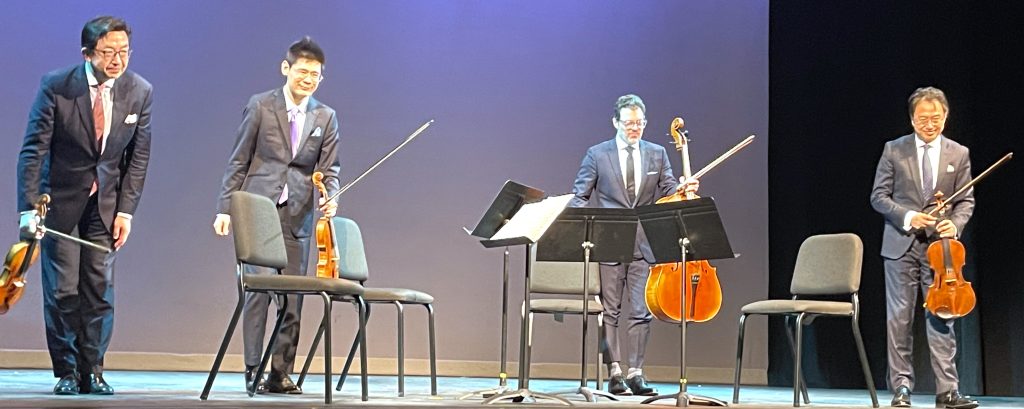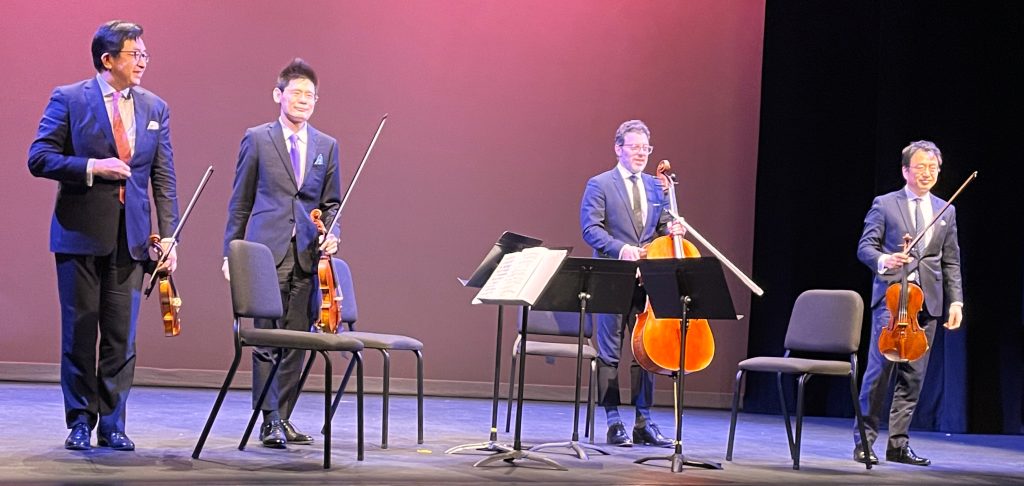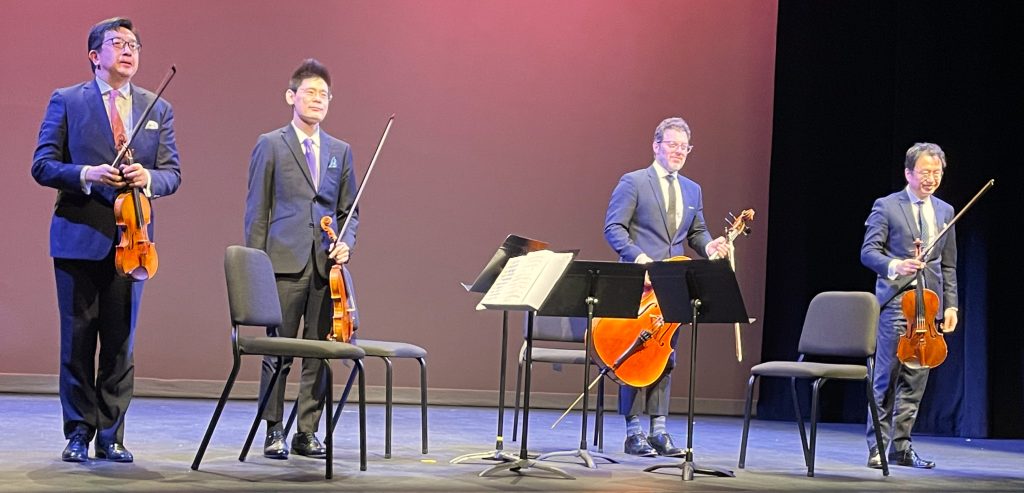
by Kevin T McEneaney
The first time I heard the Shanghai Quartet, I was driving on Route 44 going west into Millbrook while listening to Robin Hood Radio playing cuts from their album Music for a Sunday Afternoon in the Spring of 1995. I quickly purchased the CD and have been following them ever since. I was entranced by lead violinist Weigang Li and the flute of Eugenia Zuckerman, who has long promoted this marvelous quartet. Eugenia made a brief appearance on stage with David Hall, the new Director of the Clarion Concert Series.
Back in 1995 I could not have foreseen that The Shanghai Quartet would become one the top quartets (with over thirty CDs) on this fairly large globe, yet here they were here on Saturday at the old Hudson Hall opera house with wonderful acoustics.
They opened with String Quartet in D major, Op. 20, no. 4 by Franz Joseph Haydn; one of the six quartets, nicknamed The Sun Quartets; these six quartets offered the artistic model for quartet composition for the next two hundred or so years; for the first time exciting harmonic inflection radiated from the interplay of four instruments.
This quartet opens with the composer in bed waking up to sunlight, brimming with excitement for the day. He begins to compose with inspiration, then hits a snag. He doesn’t know the way forward, so he pens a letter. Midway in the letter, he abandons the letter since the way forward has occurred to him, so he returns to composing, yet once again feels stumped. He returns to letter writing. Stoppages are dramatized by failed recapitulations. Sunlight assists his composition, and the first movement is completed.
The second movement focuses on public court lunch. Haydn sits near the table of the King and eavesdrops. The first movement portrays the amusing repartee and gossip between the Queen (second violin) and the wife of the Treasurer (viola). The second movement presents a discussion with the King (first violin) and the Treasurer (cello). The King speaks of marvelous events while the Treasurer solemnly reminds the King of the cost of such expensive day-dreams. For the third movement the composer then takes a leisurely stroll in the gardens admiring the flowers, shrubs, and the gardeners at work, then approaches the mystery of the wild woods and returns to his room. The fourth movement portrays the evening banquet party with wine and ribald Hungarian gypsy music with a couple of virtuoso dancers to amuse the guests.
All the work of a single day, the first and third movements being the portrait of an artist, the second and fourth being observation of public happenings. Haydn often wrote short notes of thanks to the Creator at the conclusion of his compositions. Opus 20, no. 4 is the only one that reads “Gloria in excelsis Deo.”

The past few years the Shanghai Quartet has been based at The Tianjin Juilliard School. They played eights short ancient Chinese folk songs from different provinces. Folk songs around the globe were often a short form of program music that told a story. They were predominantly lyrical in their leaning. My favorites were “The Flowing Stream” and “Jasmine Flower.” The final two delivered shocking contrast. “A Single Bamboo Can Easily Bend” told the plangent story of a young woman sadly resigned to an arranged marriage, while “Leaving Home” with amusing, comic irony depicted the exuberant mood of a young naïve adolescent exuberantly adventuring forth to independence without a penny in his pocket. In these simple yet sophisticated arrangements there were moments when the viola of Honggang Li sounded like the Chinese two-stringed erhu.
After Intermission they performed String Quartet in G minor, No. 1, Op. 27 by Edvard Grieg. While this work is rarely performed in this country, it remains a monumental masterpiece and it was recorded on the first published CD of the Shanghai Quartet in 1994. This work offers a showpiece for a great violinist and from the start it has been a favorite of first violinist Weigang Li and his brother, viola player Honggang Li who have been the core players since their founding. This work astonished Debussy and deeply influenced him.
The work is so original that everyone has difficulty describing what it is. The prelude opens with the sound of a river growing and roaring to its destination which appears to be a cliff spilling to a fiord. For half an hour one feels lost in the woods and snow of Norway. Extroverted beauties of nature sit adjacent to intimate domestic memories. In four movements the work provides a hymn to creation and an invitation to the secret moments of personal life (especially the second movement). Cellist Nicholas Tzavaras was superb in his grounded, resonant sonority while Angelo Xiang Yu on second violin soared, when necessary, as Hongang Li on viola assured the audience that there was sanity amid the mystical magic of Weigang Li on a violin that furiously breathed the universe. For the third time in my life, I sat stunned with tears welling in my eyes, not because I was sad, but because my spirit was floating in ecstasy, and I had no words, nor explanation for what I experienced.
This was a concert that I can never forget!
